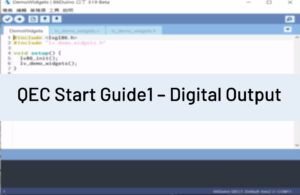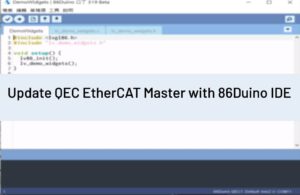Firmata is a generic protocol for communicating with microcontrollers like the Arduino and 86Duino from software on a host computer. The protocol details can be found in the wiki page, and for more on the Firmata protocol, see http://firmata.org.
The Firmata library implements the Firmata protocol and allows you to write custom firmware without having to create your own protocol and objects for the programming environment that you are using. (You may be interested in seeing the video that shows 86Duino communicates with Processing via the Firmata library.)
Methods
Firmata.begin: start the libraryFirmata. begin(long): start the library and override the default baud rateFirmata.printversion: send the protocol version to the host computerFirmata.blinkVersion: blink the protocol version on pin 13Firmata.printFirmwareVersion: send the firmware name and version to the host computerFirmata.setFirmwareVersion(byte major, byte minor): set the firmware name and version, using the sketch’s filename, minus the .pde
Sending Messages :
Firmata.sendAnalog(byte pin, int value): send an analog messageFirmata.sendDigitalPorts(byte pin, byte firstPort, byte secondPort): send digital ports asindividual bytesFirmata.sendDigitalPortPair(byte pin, int value): send digital ports as one intFirmata.sendSysex(byte command, byte bytec, byte* bytev): send a command with an arbitrary array of bytesFirmata.sendString(const char* string):send a string to the host computerFirmata.sendString(byte command, const char* string): send a string to the host computer using a custom command type
Receiving Messages :
Firmata.available(): check to see if there are any incoming messages in the bufferFirmata.processInput(): process incoming messages from the buffer, sending the data to any registered callback functionsFirmata.attach(byte command, callbackFunction myFunction): attach a function to an incoming message typeFirmata.detach(byte command): detach a function from an incoming message type
Callback Functions
In order to attach your function to a message type, your function must match the standard callback function. There are currently three types of callback functions in Firmata: generic, string, and sysex.
- generic
void callbackFunction(byte pin, int value); - system_reset
void systemResetCallbackFunction(void); - string
void stringCallbackFunction(char *myString); - sysex
void sysexCallbackFunction(byte pin, byte byteCount, byte *arrayPointer);
Message Types :
These are the various message types that you can attach functions to.
ANALOG_MESSAGE: the analog value for a single pinDIGITAL_MESSAGE: 8-bits of digital pin data (one port)REPORT_ANALOG: enable/disable the reporting of analog pinREPORT_DIGITAL: enable/disable the reporting of a digital portSET_PIN_MODE: change the pin mode betweenINPUT/OUTPUT/PWM/etc.FIRMATA_STRING: C-style strings, usesstringCallbackFunctionfor the function typeSYSEX_START: generic, arbitrary length messages (via MIDI SysEx protocol), usessysexCallbackFunctionfor the function typeSYSTEM_RESET: message to reset firmware to its default state, usessystemResetCallbackFunctionfor the function type
範例
This example shows how to send and receive analog messages using Firmata.
#include <Firmata.h>
byte analogPin;
void analogWriteCallback(byte pin, int value)
{
pinMode(pin,OUTPUT);
analogWrite(pin, value);
}
void setup()
{
Firmata.setFirmwareVersion(0, 1);
Firmata.attach(ANALOG_MESSAGE, analogWriteCallback);
Firmata.begin();
}
void loop()
{
while(Firmata.available()) {
Firmata.processInput();
}
for(analogPin = 0; analogPin < TOTAL_ANALOG_PINS; analogPin++) {
Firmata.sendAnalog(analogPin, analogRead(analogPin));
}
}DEMO VIDEO
函式庫參考主頁面
86Duino 參考的文本是根據 Creative Commons Attribution-ShareAlike 3.0 License,部分文本是從 the Arduino reference 修改的。 參考中的代碼示例已發佈到公共領域。



